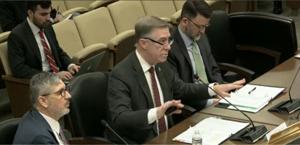(The Center Square) — The U.S. Army Corps of Engineers is looking at a plan to prevent annual flooding in the Yazoo River basin that will include resurrecting a massive pump project that has been on the Corps’ wish list since 1941.
The Corps’ Vicksburg Office and the U.S. Environmental Protection Agency held several public meetings on Thursday and Friday to reveal their plan to deal with the annual flooding. The agencies will receive public comments until June 5 before the plan is finalized on June 30.
The key part of that plan – which also includes modifications to the Steele Bayou floodgate, property buyouts, ring levees and elevating some homes – is the construction of large pumps on Steele Bayou to drain floodwater from land between the Mississippi and Yazoo rivers during floods on the Mississippi River.
The pumps proposed in the new plan would have 25,000 cubic feet of floodwater per second capacity, larger than the original project’s 14,000 CFS capacity.
Gov. Tate Reeves said in a statement that the decision was a “big victory for Mississippians.”
“We have been working tirelessly for years to ensure that the federal government ‘finishes the pumps,’ and today I want to celebrate a serious victory,” Reeves said. “I don’t need to tell Mississippi what this means for the Delta and for Mississippi.”
Both the state’s U.S. senators were supportive of the plan that has been advocated for unsuccessfully by Mississippi’s congressional delegation in both chambers for decades.
“It’s a major step forward for South Delta residents who have been waiting decades for the federal government to keep its promise, and also, to protect them from flooding,” said U.S. Sen. Roger Wicker in a statement. “This water management plan would help prevent nearly all the flooding that has destroyed homes and businesses, ruined crops, and devastated wildlife.”
No cost estimates were released with the plan. The original pumps were supposed to cost $220 million and have been pushed by the Delta Council and other organizations while being opposed by environmental groups.
“There is a long road ahead in terms of planning, design, funding, and construction of the pumping stations, but I am committed to doing everything I can to move this plan forward,” U.S. Sen. Cindy Hyde-Smith said in a statement. “Mississippians deserve this and have for quite some time.”
The EPA pulled the plug most recently in 2021 after conservation groups filed a lawsuit to stop the project after it was resurrected again in the waning days of the Trump administration in 2020.
The project was resurrected for the first time in 2016 after the late U.S. Sen. Thad Cochran, R-Mississippi, placed a rider into a draft appropriations bill that would have not only funded the project but also shut down any dissent by the courts or regulators over it. The rider was later removed and the project remained in limbo.
The project was originally scuttled by the EPA in 2008 after studies showed that it would’ve harmed more than 200,000 acres of valuable wetlands, including the Panther Swamp National Wildlife Refuge, the Yazoo National Wildlife Refuge, and the Delta National Forest.
The EPA’s decision was later confirmed in U.S. federal court in 2011 after defenders of the project mounted a legal challenge to the EPA.





















































